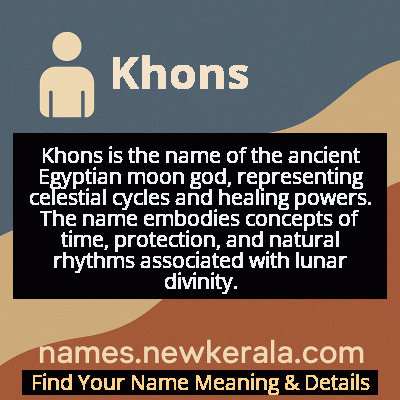Khons Name Meaning & Details
Origin, Popularity, Numerology Analysis & Name Meaning of Khons
Discover the origin, meaning, and cultural significance of the name KHONS. Delve into its historical roots and explore the lasting impact it has had on communities and traditions.
Name
Khons
Gender
Male
Origin
Egyptian
Lucky Number
4
Meaning of the Name - Khons
Khons is the name of the ancient Egyptian moon god, representing celestial cycles and healing powers. The name embodies concepts of time, protection, and natural rhythms associated with lunar divinity.
Khons - Complete Numerology Analysis
Your Numerology Number
Based on Pythagorean Numerology System
Ruling Planet
Uranus (Rahu)
Positive Nature
Strong sense of order, loyal, practical, and disciplined.
Negative Traits
Stubborn, overly serious, rigid, and prone to feeling restricted.
Lucky Colours
Blue, gray.
Lucky Days
Saturday.
Lucky Stones
Blue sapphire.
Harmony Numbers
1, 7, 8.
Best Suited Professions
Managers, engineers, accountants, organizers.
What People Like About You
Dependability, discipline, practicality.
Famous People Named Khons
Khonsu
Ancient Egyptian High Priest
Oversaw major temple rituals dedicated to the moon god Khons at Karnak
Khons A
Egyptologist
Rediscovered and documented lost lunar rituals in Theban tombs
Khons Meryre
Ancient Astronomer
Developed advanced lunar calendars used for agricultural planning
Name Variations & International Equivalents
Click on blue names to explore their detailed meanings. Gray names with will be available soon.
Cultural & Historical Significance
Temples dedicated to Khons, particularly at Karnak, became centers for lunar observations and timekeeping, where priests tracked moon phases to establish religious calendars and agricultural cycles. His association with healing made him a patron of physicians, and many medical texts invoke his name for protection during treatments. The god's youthful depiction symbolized renewal and the eternal cycle of death and rebirth that the moon represented in Egyptian cosmology. During the New Kingdom, his worship reached its peak, with pharaohs seeking his protection for military campaigns and royal health.
Extended Personality Analysis
Individuals named Khons are often perceived as possessing a calm, observant nature with deep intuitive abilities, mirroring the moon's reflective qualities. They tend to be methodical thinkers who appreciate cycles, patterns, and the passage of time, often excelling in fields requiring patience and careful observation. Like their namesake deity, they may demonstrate protective instincts toward loved ones and a natural inclination toward healing professions or supportive roles.
Their personality often balances between introspection and action—quietly analytical yet capable of decisive intervention when needed. The lunar association suggests someone who understands the importance of timing and recognizes that all things have their season, making them excellent planners and strategists. They typically value tradition and continuity while remaining open to necessary change, embodying the moon's constant transformation while maintaining its essential nature. This duality allows them to navigate complex situations with wisdom and grace, often serving as stabilizing influences in their communities.
Modern Usage & Popularity
In contemporary times, Khons remains a rare but meaningful choice, primarily used by families with Egyptian heritage or those deeply interested in ancient mythology. The name has seen a slight increase in usage following popular media featuring Egyptian themes, though it remains outside the top 1000 names in most Western countries. It's particularly favored by parents seeking unique mythological names with strong cultural roots and celestial connections. Modern bearers often appreciate the name's distinctive sound and its association with wisdom, protection, and natural cycles. The name maintains its appeal among academic families, historians, and those in healing professions who value its ancient therapeutic connotations, while its rarity ensures it stands out in multicultural settings.
Symbolic & Spiritual Meanings
Symbolically, Khons represents the cyclical nature of existence, embodying themes of renewal, reflection, and measured progress. The moon's phases mirror human experiences of growth, culmination, release, and rebirth, making Khons a symbol of life's natural rhythms. His healing associations extend metaphorically to emotional and spiritual restoration, suggesting the capacity to mend what is broken through patience and timing. As a lunar deity, he symbolizes intuition, feminine energy (despite being male), and the subconscious mind—the hidden aspects of personality that emerge in darkness. The name also carries connotations of protection during journeys, both physical travels and metaphorical life passages, offering guidance through uncertain times much like the moon illuminates the night sky while maintaining its mysterious, ever-changing nature.

